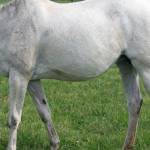Mortality of Foaling Mares: Causes Revealed

Gastrointestinal diseases account for the most deaths among broodmares near the time of foaling, according to a recent report from the University of Kentucky.
Based on a review of 3,000 necropsies, 121 cases of peripartum death were identified by researchers at the University of Kentucky Veterinary Diagnostic Laboratory over a two-year period. Of those 121 deaths, 52 (43%) were related specifically to gastrointestinal disease.
Cecal rupture, colonic torsion, and colonic rupture accounted for the most deaths, but other diseases were noted, including rectal tear or prolapse, cecal impaction, and gastric rupture.
Deaths unrelated to the gastrointestinal tract were placed in one of four other categories: musculoskeletal, reproductive, vascular, or miscellaneous.
The report stated that fatal vascular lesions were responsible for 24% of peripartum deaths and included rupture of the uterine artery which, of all disease identified, was the number one cause among these peripartum deaths.
A well-functioning gastrointestinal tract depends largely on an appropriate diet based on high-quality forage and concentrates. For mares in late gestation and early lactation, a suitable diet that meets escalating energy needs remains an essential element of sound management. Aside from the staples of forage and concentrates, supplementation with research-proven nutrients, such as omega-3 fatty acids and natural-source vitamin E, can boost reproductive success.
Loynachan, A. 2020. Peripartum Death in Mares. Equine Disease Quarterly 29:1.








